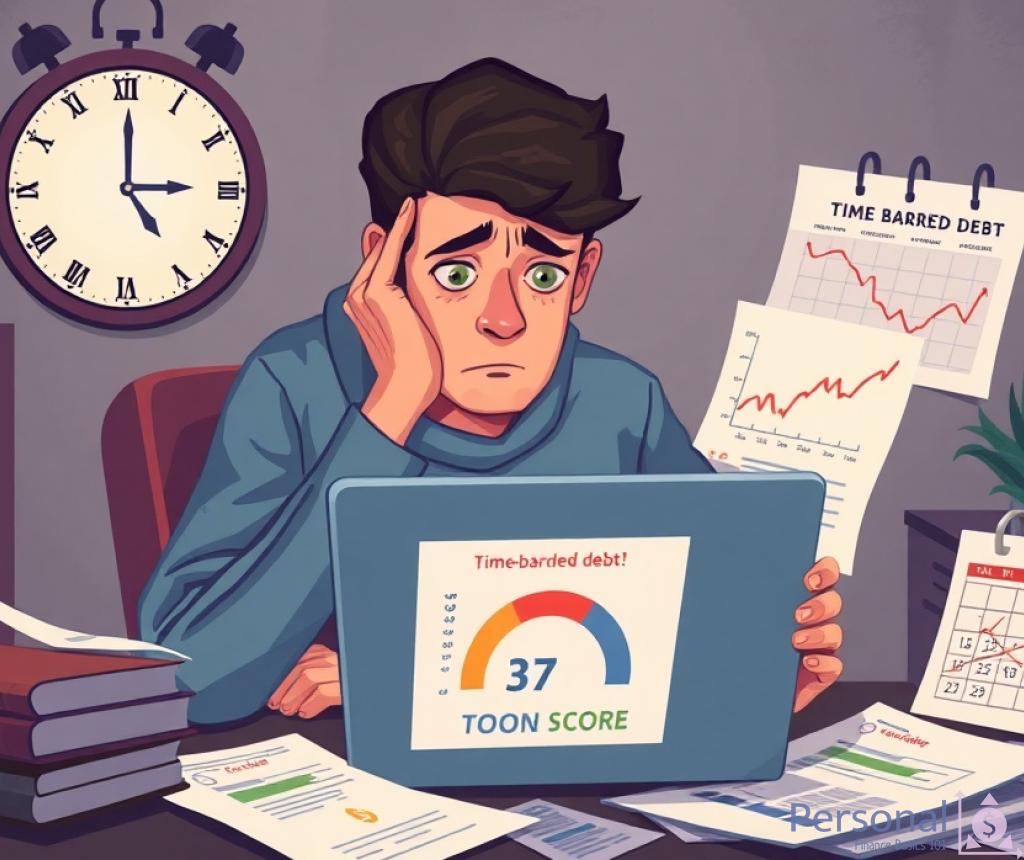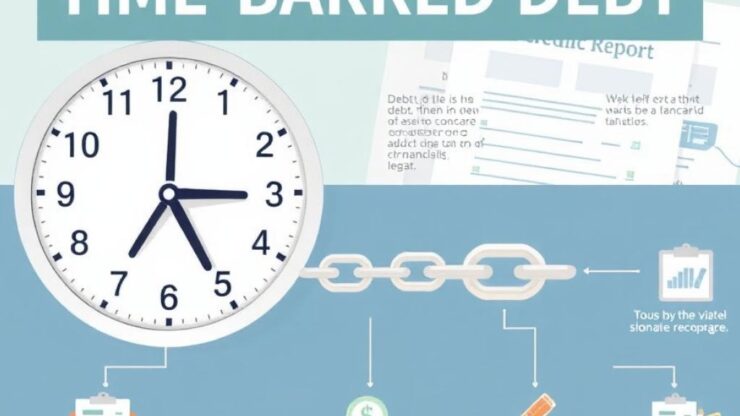Understanding Time-Barred Debt
Time-barred debt refers to debts that can no longer be legally enforced due to the expiration of the statute of limitations. This legal timeframe varies by state and type of debt, creating a complex landscape for consumers to navigate. Understanding this concept is crucial as it directly impacts your credit report and financial decisions.
When a debt becomes time-barred, it does not mean that you no longer owe the debt; rather, the creditor loses the legal right to sue you for repayment. However, the debt may still appear on your credit report, potentially affecting your credit score and your ability to secure new credit.
Experiencing time-barred debt can have significant implications for your credit report. Even though the debt cannot be legally enforced, its presence on your report can still influence your creditworthiness. Understanding how time-barred debts are reported and their potential effects is essential for maintaining a healthy credit profile.
Here are some key points to consider:
- Reporting Duration: Time-barred debts can remain on your credit report for up to seven years from the date of the last payment or the date of default.
- Impact on Credit Score: While time-barred debts may not be reportable in a legal sense, they can still lower your credit score, affecting your ability to obtain loans or credit.
- Consumer Rights: Consumers have the right to dispute inaccuracies on their credit reports, including the reporting of time-barred debts.
To effectively manage time-barred debt, consumers must be proactive in understanding their rights and options. The following strategies can help you navigate these challenges:
- Know Your State Laws: Research your state’s statute of limitations for different types of debt to determine if your debt is time-barred.
- Review Your Credit Report: Obtain a copy of your credit report to identify any time-barred debts and verify their reporting accuracy.
- Consult a Professional: Consider seeking advice from a financial advisor or credit counselor to explore options for managing debt and improving your credit score.
Impact on Credit Scores

Time-barred debt may seem like a distant concern, but its repercussions can linger in your financial life much longer than the expiration of legal enforceability. As consumers, it is critical to recognize how these debts impact credit scores, potentially complicating your financial landscape even after the legal obligation has faded.
Understanding Score Implications: When a debt transitions to a time-barred status, it does not simply vanish from your credit report. Instead, it retains a presence that can significantly affect your credit score. The scoring models used by lenders consider the age and status of debts, and while time-barred debts cannot be enforced legally, their mere existence can signal financial distress to potential creditors. This indicates that even after the statute of limitations has passed, the shadow of the debt can still loom large.
The Long-Term Effects: The impact of time-barred debt on credit scores is multifaceted. Not only can these debts lower your overall score, but they can also influence lending decisions. Many lenders view the presence of any negative marks, including time-barred debts, as a risk factor. This perception can lead to higher interest rates or even denial of credit applications, thus making it imperative for consumers to actively manage their credit profiles.
| Credit Score Range | Potential Impact of Time-Barred Debt |
|---|---|
| 300-579 | Severe impact; may lead to credit denial |
| 580-669 | Moderate impact; higher interest rates likely |
| 670-739 | Minor impact; still may affect favorable loan terms |
| 740+ | Minimal impact; potential for better rates but can still be a concern |
Mitigating the Risks: To lessen the adverse effects of time-barred debt on your credit score, it is essential to engage in proactive credit management. Regularly monitoring your credit report allows you to identify time-barred debts and assess their accuracy. Furthermore, consumers can take steps to improve their credit scores—such as timely payments on existing accounts and maintaining low credit utilization ratios. By being informed and proactive, you can navigate the complexities of time-barred debt and maintain a healthier financial profile.
Legal Implications of Time-Barred Debt

The journey through the landscape of time-barred debt is not solely financial but also laden with legal intricacies. Understanding the legal implications surrounding these debts is vital for consumers who wish to safeguard their financial health and avoid potential pitfalls. When a debt becomes time-barred, it signifies that the creditor’s ability to take legal action to recover the debt has expired, but this does not eliminate the consumer’s responsibility to navigate the ongoing repercussions.
One of the most critical legal aspects is the statute of limitations, which varies by state and type of debt. This law sets a deadline for creditors to initiate a lawsuit for collection, and once this period lapses, it can no longer be used as a basis for legal action. However, it is essential to recognize that while you may not face legal consequences, creditors can still attempt to collect the debt through other means, such as phone calls or letters. Understanding your rights in these situations is crucial.
Consumers are frequently unaware of their rights when it comes to time-barred debts. The Fair Debt Collection Practices Act (FDCPA) offers protections against abusive collection tactics, even for debts that are no longer legally enforceable. For instance, if a collector attempts to sue you for a time-barred debt, they are violating the law, and you have the right to report such actions. Moreover, consumers can request validation of the debt, which means the collector must provide proof that the debt is valid and owed by you.
Another important aspect to consider is that disclosing a time-barred debt to a credit reporting agency does not inherently violate the law, but it can mislead consumers if not properly communicated. This can create confusion regarding your actual financial obligations. Therefore, it is beneficial to keep thorough records and stay informed about any debts reported on your credit report, especially those that may be time-barred.
For individuals grappling with time-barred debt, it is advisable to approach the situation with knowledge and strategy. If you discover that a creditor is attempting to collect a debt that you believe is time-barred, you may consider consulting with a legal professional to evaluate your options. Taking proactive steps, such as documenting all communications and understanding your state’s laws, can strengthen your position.
Moreover, if you find that time-barred debts are impacting your credit profile, addressing them through dispute processes can help rectify inaccurate reporting. Engaging with credit bureaus and asserting your rights can lead to a more accurate representation of your credit history. By staying informed and proactive, consumers can effectively navigate the complexities associated with time-barred debts, ultimately leading to a more secure financial future.
Strategies for Managing Time-Barred Debt
When it comes to managing time-barred debt, having a comprehensive understanding of your financial landscape is essential. This knowledge empowers you to make informed decisions and take strategic actions that can significantly improve your financial health. Recognizing the implications of time-barred debt on both your credit report and overall financial situation is the first step in effective management.
To successfully navigate the challenges posed by time-barred debt, consider the following strategies that can help mitigate its impact on your credit health:
- Assess Your Debt Situation: Begin by compiling a complete list of all your debts, noting the status of each, including those that may be time-barred. Understanding the age of your debts will help you identify which ones are beyond the statute of limitations.
- Monitor Your Credit Report: Regularly review your credit report to track any negative marks, including time-barred debts. This will enable you to dispute inaccuracies and ensure that your report accurately reflects your financial situation.
- Document Everything: Keep thorough records of all communications with creditors and debt collectors. This documentation can be invaluable in protecting your rights, especially if a collector attempts to pursue a time-barred debt.
- Communicate with Creditors: If you are approached about a time-barred debt, consider reaching out to the creditor or collector. You can assert your rights and clarify your position regarding the debt’s enforceability.
- Seek Professional Help: Don’t hesitate to consult with a financial advisor or a legal professional who specializes in debt management. Their expertise can provide valuable insights and assist you in formulating a tailored strategy to address your specific situation.
Knowledge is your best ally when managing time-barred debt. Equip yourself with information regarding your rights and the legal implications of debt collection practices. Understanding the relevant laws, such as the Fair Debt Collection Practices Act, can empower you to take action against any unfair collection attempts. By staying informed and proactive, you can effectively navigate through the complexities of time-barred debt, ultimately leading to a stronger financial future.
Differentiating Between Time-Barred and Non-Time-Barred Debt
Understanding the distinction between time-barred and non-time-barred debt is essential for consumers navigating their financial landscape. While both types of debt can influence your credit profile, their implications and the legal recourse available to creditors and consumers differ significantly. Recognizing these differences can empower you to make informed decisions regarding your financial health.
The most defining characteristic of time-barred debt is its legal enforceability. Once a debt surpasses the statute of limitations, creditors lose the right to initiate legal action to recover the amount owed. This can provide a sense of relief to consumers who are struggling with financial burdens. However, it’s important to understand that just because a debt is time-barred does not eliminate your responsibility to pay it. Non-time-barred debts, on the other hand, remain subject to legal action, meaning that creditors can pursue collection efforts through lawsuits or other means. This fundamental difference not only impacts your immediate financial obligations but also shapes how you approach debt management.
Both time-barred and non-time-barred debts can appear on your credit report, but their impact on your credit score may vary. While time-barred debts can linger on your report for up to seven years, their influence on your score is often perceived differently by potential lenders. Non-time-barred debts may have a more pronounced impact, potentially affecting your creditworthiness more severely due to their enforceability. Lenders view non-time-barred debts as an indicator of ongoing financial risk, which could lead to higher interest rates or denial of credit applications. In contrast, time-barred debts may still raise red flags but are often seen as less threatening since they cannot be legally enforced.
Ultimately, the contrast between time-barred and non-time-barred debts is crucial for consumers aiming to maintain a healthy credit profile. By understanding these differences, you can navigate the complexities of debt management with greater confidence and clarity. Being informed about the legal implications and the potential ramifications on your credit report allows you to take proactive steps toward securing your financial future.
Disclaimer
This article has been created or edited with the support of artificial intelligence and is for informational purposes only. The information provided should not be considered investment advice. Please seek the support of a professional advisor before making any investment decisions.






